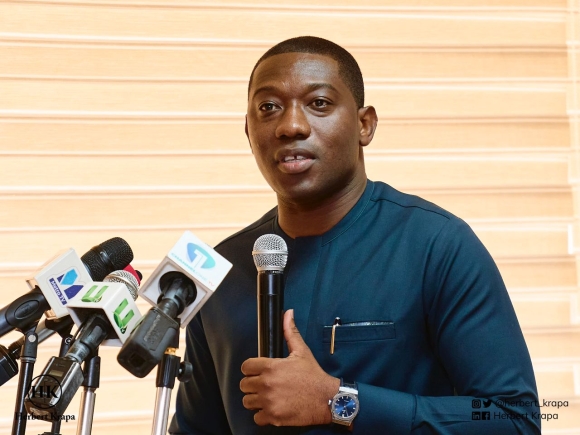
Krapa promises better regulations, policies to boost local content in oil and gas industry
The Minister of Energy, Mr. Herbert Krapa, has reaffirmed the government's commitment to implementing progressive laws, policies, and programmes aimed at building indigenous capacities and increasing the competitiveness of local Ghanaian industries in the oil and gas sector.
He explained that this strategy seeks to use petroleum production as a catalyst for accelerated and sustainable economic growth and development in the country.
Mr. Krapa made these remarks while opening the 2024 Local Content Conference and Exhibition in Takoradi. The two-day event, organized by the Petroleum Commission, attracted participants from oil and gas companies, regulatory agencies, and allied organizations from across West and Southern Africa.
The Minister announced that the government has directed the Petroleum Commission to strategically promote the development of indigenous capacity, ensuring in-country value creation, employment and skills development, technology transfer to Ghanaians, equity participation for Ghanaian businesses, and stronger linkages between the oil and gas sector and the broader economy.
"We promote indigenous companies not to discourage foreign participation or perpetuate inefficient and uncompetitive local businesses, but to ensure enduring and true partnerships," Mr. Krapa said.
He stressed that the government's aim is not to nationalize the petroleum sector or engage in protectionist measures, but to build indigenous capacity as a reliable avenue for positively impacting the country's development.
Reforms
Addressing regulatory reforms, Mr. Krapa said the government has reviewed aspects of the existing legal and regulatory framework to attract new investments in exploration and production activities. He noted that these reforms should encourage current companies to continue investing in new drilling operations and optimize recovery from existing fields.
“Amendments have been made to the Petroleum (Exploration & Production) General Regulations, L.I. 2359, to allow the Minister for Energy to grant approval for exploration within Development and Production Areas. The Petroleum Commission can also expand the delineation of these areas to cover prospects and leads in contract zones,” he explained.
Mr. Krapa added that these reforms have sparked discussions around Infrastructure-Led Exploration, with existing infrastructure playing a central role in driving new investments.
The reforms have also introduced more flexible relinquishment arrangements, enabling contractors to retain certain prospects and leads for further exploration. This allows for the extension of contract areas into adjoining open acreages, enabling the exploitation of low-risk prospects without the need for new Petroleum Agreements.
Aggressive investment promotion
Mr. Krapa outlined the government's aggressive investment promotion strategy, particularly focusing on the Eastern Offshore Ghana and Tano Basins, aimed at attracting private capital for exploration and production activities.
“We are continually evolving our fiscal regime to make it more attractive for investment. Our focus is to be sensitive to the size of discoveries, water depths, investment risks, development and operating costs, and market conditions, such as crude oil prices. We are also working to rationalize GNPC's participation and minimize the front-loading elements of the fiscal system.”
Call for action
Mr. Krapa challenged organizers and participants at the conference to ask the tough questions and come up with actionable outcomes, which he termed “a Takoradi Resolution.”
“The lawyers should get to work. Training programme requirements should be strengthened. Incentives for small business development should be on the table. Our curriculum, especially in tertiary institutions, should be re-examined for the results we want. We should see more top-level employment opportunities, and we must learn from past mistakes,” he urged.
He also expressed concern that after nearly 15 years of active oil and gas production, only a few indigenous exploration and production companies are operating in the industry. He attributed this to inadequate indigenous capacity and limited access to capital.
“This conference should focus on that. Ask the hard questions about channel partnerships and strategic alliances, and come back with innovative answers,” he charged the participants.
